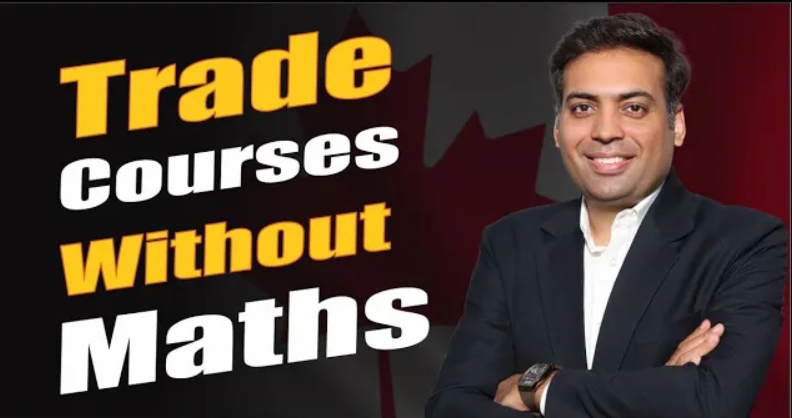Table of Contents
ToggleTop Trade Courses Without Mathematics for Canada Study Visa & PR in 2025

Many international students dream of studying and settling in Canada. However, students who have completed their 12th without mathematics, particularly from commerce or arts streams, often worry about limited academic options. The good news? You can still pursue trade courses in Canada without maths and build a pathway to Permanent Residency (PR). These trade courses are not only visa-friendly but also open doors to special PR streams like the Express Entry’s trade category and the Ontario PNP’s in-demand skills stream.
At Globexa Immigration, we help students like you choose the right trade program, handle admissions, prepare visa files, and guide you all the way to PR.
1. Why Choose Trade Courses in Canada?
Trade courses offer multiple advantages:
High employability in construction, manufacturing, electrical, plumbing, and technical sectors.
Direct eligibility for PR under special trade draws in Express Entry.
Lower CRS (Comprehensive Ranking System) cut-off scores — often below 450.
Available to students who completed 12th without mathematics.
Unlike general diplomas or degrees, trade courses fall under Canada’s skilled trades NOC codes, which are a key part of Canada’s economic immigration plan.
At Globexa Immigration, we specialize in helping non-maths students secure admissions in approved trade programs that lead to PR.
2. Who Can Apply Without Mathematics?
If you have not studied mathematics in 12th, you still qualify for select trade programs. Most colleges assess 10th-grade math marks, typically requiring 60% or higher.
You can apply if:
You are from Commerce (without maths) or Arts background.
You have 50% or more in 12th (even 40–45% may be accepted in some cases).
You scored 60%+ in 10th-grade mathematics.
You meet the minimum English language test requirements.
Globexa Immigration can assist in verifying your eligibility and recommending the right college and program options based on your academic profile.
3. Top Trade Courses Without Maths in Canada – January 2026 Intake
1. Construction Techniques – George Brown College, Toronto
Duration: 1 year (12 months)
Tuition Fee: ~$24,000 CAD
Application Fee: $110 CAD
Intakes: January, May, September
Eligibility:
12th pass with 50% (try even with 45%)
10th Maths with 60%
IELTS: Overall 6.0, no band less than 5.5
Duolingo: 110 (no band below 90)
PTE: 54 (no band below 50)
👉 Globexa Immigration can help you apply with Duolingo for admission and guide you to switch to IELTS for visa filing.
2. Mechanical Techniques – Plumbing (1 Year) – Fleming College, Peterborough
Duration: 8 months
Tuition Fee: ~$15,000 CAD
Application Fee: $100 CAD
Intakes: Jan, May, September
Eligibility:
12th with 50% (try even with 40–45%)
10th Maths 60%
IELTS: 6.0 (each module)
Duolingo: 105+
PTE: 46+ (for admission only)
Globexa Immigration recommends using IELTS for visa lodgment to avoid refusal risks.
3. Mechanical Techniques – Plumbing – Sheridan College, Brampton
Duration: 1 or 2 years available
Tuition Fee: ~$19,000 CAD
Application Fee: $100 CAD
Intakes: Jan, May, September
Let Globexa Immigration help you plan a 2-year strategy combining plumbing with another diploma for PGWP eligibility.
4. Mechanical Techniques – CNC & Machining – Sheridan College
Duration: 8 months
Tuition Fee: ~$19,000 CAD
Language Requirements:
IELTS: 6.0, no less than 5.5
PTE: 58+
Duolingo: 105+
5. Electrical Techniques – Sheridan College
Duration: 8 months
Fee: ~$17,000 CAD
Eligibility:
12th with 50%
10th-grade math with 60%
IELTS: 6.0 (minimum band 5.5)
4. IELTS or Duolingo? What’s Better?
For visa success, IELTS remains the most trusted and widely accepted. Although many colleges accept Duolingo or PTE for admission, it is strongly recommended to submit your visa file with IELTS — minimum 6.0 in all modules.
Globexa Immigration does not recommend filing a visa with low scores or non-standard tests like PTE or TOEFL unless absolutely necessary.
5. How to Get a 3-Year PG Work Permit?
Even if your trade program is for 1 year, you can still qualify for a 3-year Post Graduate Work Permit (PGWP) by:
Combining 2 one-year diplomas, e.g., Mechanical Techniques (Year 1) + Supply Chain Management (Year 2).
Or enrolling directly into a 2-year diploma.
Globexa Immigration can create a complete academic pathway to help you qualify for a full PGWP.
6. PR Pathways After Studying Trade Courses
1. Ontario PNP – International Student Stream
Full-time job at TEER 0, 1, 2, or 3 level
Requires Canadian education + job offer
Globexa Immigration helps identify eligible employers
2. Ontario PNP – In-Demand Skills Stream
9 months of work in TEER 4 or 5 jobs
Suited for general laborers, machine operators, and trade helpers
3. Express Entry – Federal Skilled Trades Category
Trade occupation experience qualifies you for a special Express Entry draw
Lower CRS cutoff, often below 450
Ideal if you accumulate 1 year of Canadian work experience post-study
Final Words from Globexa Immigration
Don’t let the absence of mathematics stop your Canadian dream!
If you’re a student with arts or commerce background, or even a graduate looking to shift careers, trade courses are your golden ticket. With high demand in trades, flexible study options, and multiple PR routes, this is your chance to secure a future in Canada.
Globexa Immigration is here to help you:
Choose the right course and college
Secure admission quickly using Duolingo or IELTS
File a strong visa application
Plan your pathway to PR through Ontario PNP or Express Entry
Contact Globexa Immigration today!


